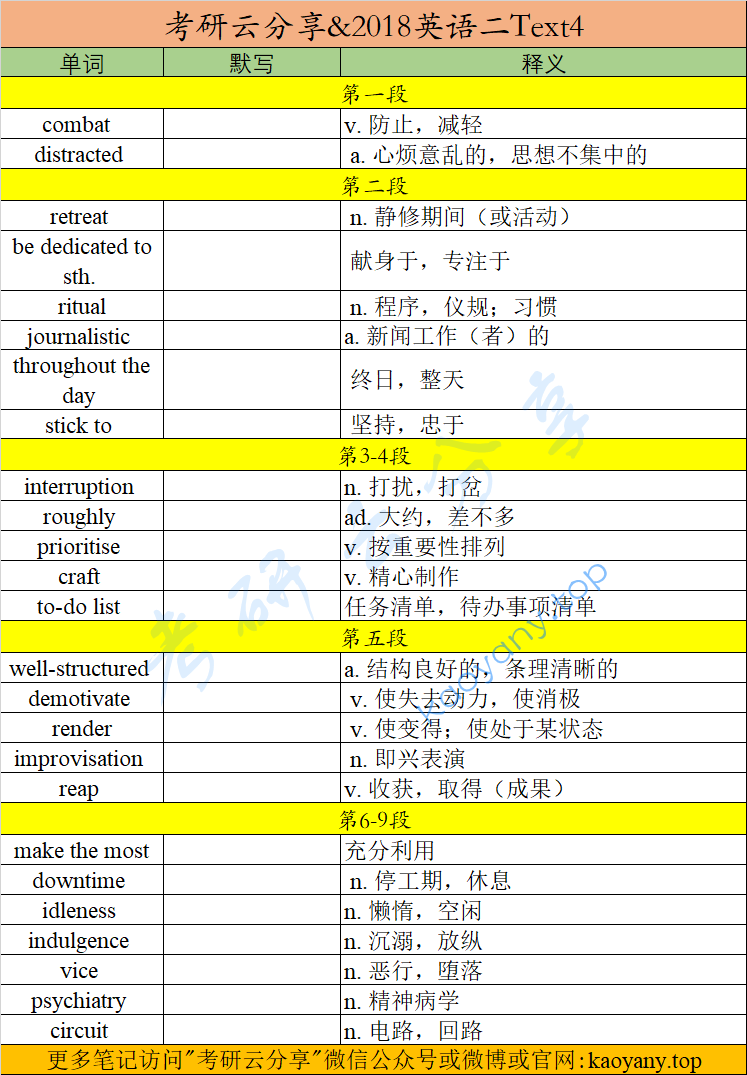第一段
①To combat the trap of putting a premium on being busy, Cal Newport, author of Deep work: Rules for Focused Success in a Distracted World, recommends building a habit of “deep work”-the ability to focus without distraction.
单词&词组
combat v. 防止,减轻
distracted a. 心烦意乱的,思想不集中的
本段翻译
为避免陷入“高度重视忙碌”的陷阱,卡尔·纽坡特,《深度工作:在一个让人分心的世界,集中精力取得成功的法则》一书作者,建议打造“深度工作”的习惯——集中注意力、不分心的能力。
第二段
①There are a number of approaches to mastering the art of deep work-be it lengthy retreats dedicated to a specific task; developing a daily ritual; or taking a “journalistic” approach to seizing moments of deep work when you can throughout the day.②Whichever approach, the key is to determine your length of focus time and stick to it.
单词&词组
retreat n. 静修期间(或活动)
be dedicated to sth. 献身于,专注于
ritual n. 程序,仪规;习惯
journalistic a. 新闻工作(者)的
throughout the day 终日,整天
stick to 坚持,忠于
本段翻译
掌握深度工作艺术的方法有很多或是长久隐退、专注于某一特定工作;或是形成一种日常惯例;或是采取“新闻工作者”的方法,抓住一天中能抓住的深度工作时刻。无论哪种方式,关键都是:确定你的专注时长并坚持下去。
第三段
①Newport also recommends “deep scheduling” to combat constant interruptions and get more done in less time.②“At any given point, I should have deep work scheduled for roughly the next month.Once on the calendar,I protect this time like I would a doctor’s appointment or important meeting”, he writes.
单词&词组
interruption n. 打扰,打岔
roughly ad. 大约,差不多
本段翻译
纽坡特还建议“深度规划”以对抗持续干扰并在更短的时间内完成更多的工作。“在任何特定时刻,我都会为接下来的大约一个月制定深度工作计划。一旦落于日程表,我就会一如守护就诊预约或重要会议安排一样守护这一时间安排”,他写道。
第四段
①Another approach to getting more done in less time is to rethink how you prioritize your day-in particular how we craft our to-do lists.②Tim Harford, author of Messy: The Power of Disorder to Transform Our Lives, points to a study in the early 1980s that divided undergraduates into two groups: some were advised to set out monthly goals and study activities; others were told to plan activities and goals in much more detail, day by day.
单词&词组
prioritise v. 按重要性排列
craft v. 精心制作
to-do list 任务清单,待办事项清单
本段翻译
另一项实现事半功倍之策就是反思“你是怎样安排你的一天的”—特别是,我们是怎样精心制作任务清单的。②提姆·哈福德,《混乱:改变我们生活的无序力量》的作者,提到了20世纪80年代初的一项研究:该研究将本科生分为两组,一些被建议设定每月的目标及学习活动;另一些人被要求逐日地、更详细地计划活动及目标。
第五段
①While the researchers assumed that the well-structured daily plans would be most effective when it came to the execution of tasks, they were wrong: the detailed daily plans demotivated students.②Harford argues that inevitable distractions often render the daily to-do list ineffective, while leaving room for improvisation in such a list can reap the best results.
单词&词组
well-structured a. 结构良好的,条理清晰的
demotivate v. 使失去动力,使消极
render v. 使变得;使处于某状态
improvisation n. 即兴表演
reap v. 收获,取得(成果)
本段翻译
虽然研究者假设为,井井有条的每日计划对于任务执行会非常有效,但是他们错了:详尽的每日计划使学生受挫。哈福德提出,无可避免的干扰通常会使每日任务清单失效,而在任务清单中留出临时应变的空间则能收获最佳结果。
第六段
①In order to make the most of our focus and energy,we also need to embrace downtime, or as Newport suggests, “be lazy.”
单词&词组
make the most of 充分利用
downtime n. 停工期,休息
本段翻译
若要充分利用自身专注力以及精力,我们还需要“拥抱闲暇时间”,或如纽坡特所说,“偷偷懒”。
第七段
①“Idleness is not just a vacation, an indulgence or a vice; it is as indispensable to the brain as vitamin D is to the body...[idleness]is, paradoxically, necessary to getting any work done,” he argues.
单词&词组
idleness n. 懒惰,空闲
indulgence n. 沉溺,放纵
vice n. 恶行,堕落
本段翻译
“闲散不仅仅是一次假期、一种放纵或一个恶习;它之于大脑就像维他命D之于身体一样不可或缺……矛盾的是,它对于完成任何工作都不可或缺”,他提出。
第八段
①Srini Pillay, an assistant professor of psychiatry at Harvard Medical School, believes this counterintuitive link between downtime and productivity may be due to the way our brains operate.②When our brains switch between being focused and unfocused on a task, they tend to be more efficient.
单词&词组
psychiatry n. 精神病学
本段翻译
斯利尼·皮莱,哈佛医学院的一位精神病学助理教授,认为“闲暇时光”与“生产效率”之间有违直觉的联系可能源于我们大脑的运作方式。当我们的大脑就某项工作在“集中注意力”与“分散注意力”之间切换时,它们往往更高效。
第九段
①“What people don’t realise is that in order to complete these tasks they need to use both the focus and unfocus circuits in their brain”. says Pillay.
单词&词组
circuit n. 电路,回路
本段翻译
“人们没有意识到的是,要完成这些工作,他们需要使用‘专注’和‘分心'两种大脑回路”,皮莱说道。
五道题
36. The key to mastering the art of deep work is to ________.
[A] keep to your focus time
[B]list your immediate tasks
[C]make specific daily plans
[D]seize every minute to work
37. The study in the early 1980s cited by Harford shows that ________.
[A] distractions may actually increase efficiency
[B]daily schedules are indispensable to studying
[C]students are hardly motivated by monthly goals
[D]detailed plans many not be as fruitful as expected
38. According to Newport, idleness is ________.
[A] a desirable mental state for busy people
[B]a major contributor to physical health
[C]an effective way to save time and energy
[D]an essential factor in accomplishing any work
39. Pillay believes that our brains’ shift between being focused and unfocused _______.
[A] can result in psychological well-being
[B]can bring about greater efficiency
[C]is aimed at better balance in work
[D]is driven by task urgency
40. This text is mainly about _______.
[A] ways to relieve the tension of busy life
[B]approaches to getting more done in less time
[C]the key to eliminating distractions
[D]the cause of the lack of focus time
参考答案
ADDBB
答案解析
36、第二段在概述了深度工作的几种方法后指出:无论采取哪种方法, 关键是(the key is to...) 要确定你的专注时间并严格坚守。可知掌握这一技巧的关键是坚守预定的专注时间,[A]正确。
37、根据题干关键词study in the early 1980s、Harford定位到第四、五段。文中首先指出研究方法:将大学生分成两组,一组制定月度计划,一组制定详细的每日计划。随后论述研究发现:详细的每日计划反而使学生失去动力,留出临时应变空间才能实现最佳效果,可见[D]正确。
38、根据题干中Newport、idleness定位至七段Newport观点:闲散是大脑所必需, 对于完成任何工作来说都非常必要。可见[D]正确。
39、根据题干人物Pillay定位至第八、九段。第八段②句指出Pillay观点:当大脑在专注状态和非专注状态之间切换时,往往更有效率,可见[B]正确。
40、本文第一段提出全文话题:拒绝低效忙碌,打造“深度工作”的习惯。第二段说明“深度工作”的多种基本方法及唯一不变的宗旨。第三至九段论述深度工作、提高工作效率的多种具体策略。可见[B] approaches to getting more done in less time体现全文核心话题。

- 单词 词组
- 本段翻译
- 单词 词组
- 本段翻译
- 单词 词组
- 本段翻译
- 单词 词组
- 本段翻译
- 单词 词组
- 本段翻译
- 单词 词组
- 本段翻译
- 单词 词组
- 本段翻译
- 单词 词组
- 本段翻译
- 单词 词组
- 本段翻译
- 参考答案
- 答案解析
